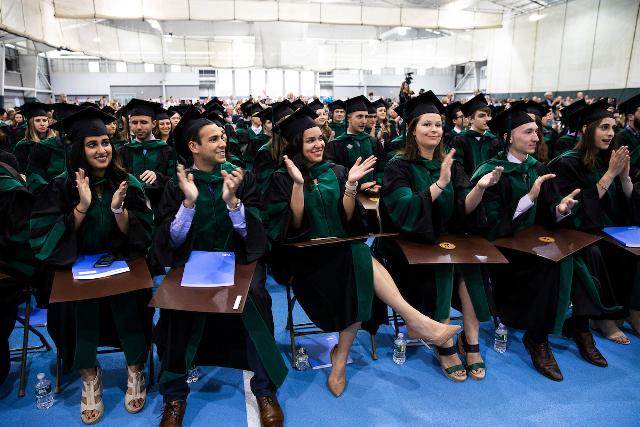-
About
-
Academics
- Physician Assistant
- Special Master’s (MBS)
-
Admissions & Financial Aid
- Tuition & Fees
-
Student Life
-
Research
- Research Labs & Centers
-
Local & Global Engagement
- Global Health Program
127th Commencement of the School of Medicine
Breaking down walls and expectations was the theme at the 127th commencement of the School of Medicine.

Breaking down walls and expectations was the theme at the 127th commencement of the School of Medicine and the thirty-ninth commencement of the Graduate School of Biomedical Sciences (GSBS).
Harris Berman, dean of the medical school, told the Gantcher Center crowd, “You graduate today not only with the skillset and tools to improve health care in underserved communities, but also to transform it so that it becomes patient centered and not provider centered.”
Andrew Jarrah, president of the medical class, described the 2019 graduates as a family. When gearing up to take their first set of board exams, “We remembered to check in on each other, reminded each other to eat, to sleep, and occasionally to shower,” he said. Later, when working on the wards, “when one of us struggled we all struggled together . . . we came to our classmates’ aid,” he said. “Instead of thinking ‘How can I be the best?’ you thought, ‘How could we be the best?’”
Graduate School Dean Daniel Jay praised several graduates by name, including Alexander Fine, who gave the GSBS student address. Fine said he applied to the GSBS Ph.D. program in part because of its downtown Boston location, with its promise of nightlife and fancy coffee. He was stunned when he was offered a spot in the mammalian genetics track at the Jackson Laboratory five hours north of Boston in Bar Harbor, Maine. Even though he saw more deer on his morning commute than humans, he quickly fell in love with the program.
“It had nothing that I wanted,” he said, “but everything that I needed.”
The experience taught him to embrace the unexpected, something all scientists should do, he said, especially when looking at study results which may be the opposite of what they expected going in. “We take a step back and throw out our pre-conceived notions,” he said.
Emeritus certificates were presented to professors Curtis Bakal, Barry Goldin, Ira Herman, Stuart Levy, Ellen Perrin, and Girard Edwin Robinson and clinical professor Peter Randolph.
At a separate ceremony for graduates of the Public Health and Professional Degree Programs, held at Cohen Auditorium, Dean Aviva Must did not have to reach to find an example of a public health crisis. She pointed to the reemergence of measles in the United States, a disease declared eliminated in 2000. “The root causes for gaps in coverage are disturbing—distrust of science, laws that limit adolescents’ agency over their own health, and the pervasive use of social media where unvetted health information can masquerade as evidence,” she said.
She encouraged the public health graduates to use the tools they’ve learned to work toward solutions such as legislation that limits vaccine exemptions, media campaigns to communicate risk, and partnerships with schools, pharmacies, and community health workers.
“We are confident that you will use these tools effectively and wisely. Apply your energy, your passion, your considerable knowledge, and your heart to be leaders and change agents in our society,” she said.
Marta del Carmen Illueca, who gave the class address, said graduates have a duty not only to society, but to their own health and integrity. “The more wholesome we are in body, mind, and spirit, the better healers of society we will become,” she said.
In his faculty address, Giles Li, executive director of the Boston Chinatown Neighborhood Center, recounted some of Chinatown’s history and its decades-long relationship with Tufts University, which has sometimes been mistrustful. But he said over the past several years it has been a joy to work with the department of Public Health and Community Medicine to address the neighborhood’s health challenges and to “witness first-hand the sincere dedication from all of you in trying to knock down the walls between the institution and the neighborhood,” he said.
“Seeing you all heading off into your communities—I know you will continue to do great work as you do your part to address inequities,” he said.
This excerpt is from the Tufts Now article: Alfre Woodard to Tufts Graduates: Speak Truth to Power